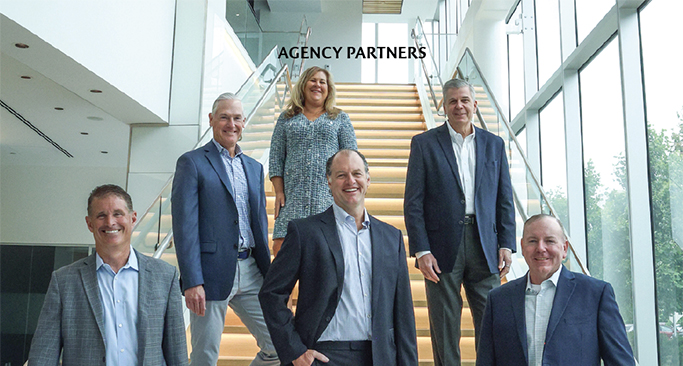First row, left to right: Brian O’Reilly, Executive Vice President and Chief Marketing Officer; John Glomb,
President and CEO; John Doyle, Executive Vice President and Chief Underwriting Officer
Second row, left to right: Bob Pottle, Executive Vice President and Chief Strategic Operations Officer, Karen Gilmer-Pauciello,
Executive Vice President, CFO and Treasurer; Bill Benecke, Executive Vice President and Chief Claims Officer
Niches, agency/broker connections,
continual improvement, and core values
fuel Philadelphia Insurance Companies’ strength and growth
By Maura C. Ciccarelli
Photography by Melanie Maganias Nashan
Philadelphia Insurance Companies’ heritage goes back more than 60 years to a predecessor company—an insurance agency—that started out offering a unique program serving the automobile industry market. That niche-focused model has been key to success for the carrier (also known as PHLY), which has expanded beyond its Philadelphia roots to have a presence in 40-plus locations across the country.

Today, PHLY offers more than 120 specialty coverages, serving small to large businesses and organizations nationwide, with a particular focus on mid-sized insureds. The carrier writes nearly $5 billion in premium through its tailored property/casualty and liability products. That growth has been fueled in part by joining the global Tokio Marine Group in 2008.
Along the way, the organization has earned an A++ (Superior) rating by AM Best, an A+ by Standard and Poor’s, and an overall Net Promoter Score (NPS) of 67.7, which is nationally recognized as “Excellent.”
In addition to commercial lines that cover 13 industry sectors, the carrier also focuses on environmental risks, E&S, surety bonds, management and professional liability, accident and health, and flood coverage. Even their one small personal lines product is niche: it protects antique and collector’s cars.
“We’re significant in the areas where we do specialize,” says PHLY President and CEO John Glomb, “and while we have a notable portion of our business that comes from small and middle market, we write plenty of multimillion-dollar policies as well.
“While we never try to be all things to all people [because] we’re committed to our niche approach,” he adds, “if you look at the distribution of premium sizes, we’re more diverse than most agents and the general public would expect.”
And, Glomb points out, “All of us are very proud because we’ve all been architects of what PHLY is today. The evolution of our company since the December 2008 acquisition by Tokio Marine has been quite dramatic. We really believe that we are unique—as a culture, as a company, in what we do for society, and in the way we partner.”
Why go niche?
Founder James J. Maguire Sr., started his specialty insurance agency in 1962, and it quickly expanded from local to national markets. By 1987, he had founded Philadelphia Insurance Companies, which joined Tokio Marine 16 years ago and has been growing ever since.
“We’ve also really tried to stay true to our roots,” says Glomb. “We are a flat organization. Tokio Marine has been thoughtful and strategic, building our corporate footprint in the U.S. and outside of Japan.
“Between PHLY and our sister companies within the Tokio Marine Group family, there’s practically no insurance solution we cannot deliver throughout the world,” he notes.
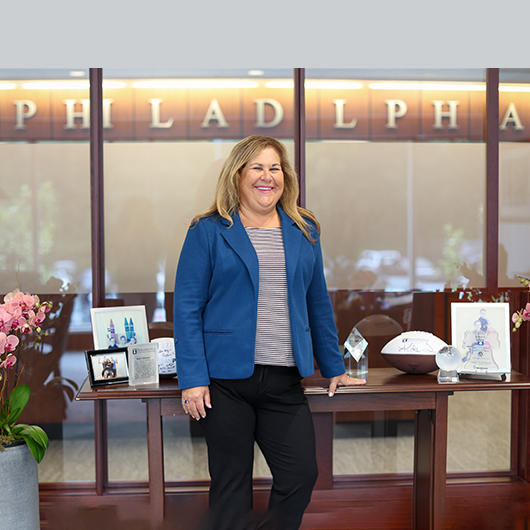
A different distribution model
Brian O’Reilly, executive vice president and chief marketing officer, says the company’s distribution structure starts with PHLY’s 150 marketing reps, who track expiration dates and get deeply involved in the renewal process. The carrier also works with national brokers and 300 preferred agencies with expertise in PHLY’s niches. And, as an open brokerage, they can reach Main Street producers, too.
This focus has driven growth, Glomb says. In 2008, preferred agents made up 35% of distribution; today, that figure is 70%. O’Reilly adds that the carrier’s financial stability over the last 30 years has kept pricing where it should be for a particular niche.
In recent years PHLY has focused on increasing the ease of doing business with agents and brokers through technology and automation, says Bob Pottle, executive vice president and chief strategic operations officer.
“We want to make sure we don’t lose the personal relationships we have with our agency partners. We want to enhance those relationships by providing options for self-service … in a way that we don’t lose that connection.”
—Bob Pottle
Executive Vice President and Chief Strategic Operations Officer

“We’re a flat organization and we have a humble leadership team. When employees join this organization, they get a sense of connectivity to the leadership of the company.”
—Bill Benecke
Executive Vice President and Chief Claims Officer
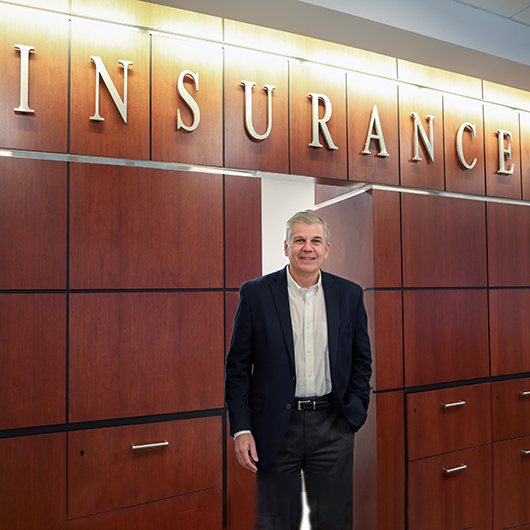
That, in turn, has strengthened relationships. “Our agency partners can work with a PHLY team member or do business with us 24/7 on our website. We’ve eliminated a lot of the noise that [having too many] touch points involves,” Pottle says.
But, he notes, it’s been done with balance in mind.
“We want to make sure we don’t lose the personal relationships we have with our agency partners,” Pottle explains. “We want to enhance those relationships by providing options for self-service and do it in a way that we don’t lose that connection. Our people are the key to our success.”
The carrier is always looking for ways to expand its offerings. This year, PHLY began rolling out a new business owners policy (BOP) product to expand into new niches. These will let smaller-sized businesses gain the service scope offered to larger organizations.
TEAMPHLY
Continuous improvement is at the heart of the insurer’s culture, as embodied by the name TEAMPHLY, Glomb says.
“Historically that is something that drives us,” he notes. “We’re competitive. We look at ourselves as underdogs despite being a part of Tokio Marine’s $83 billion, 50,000-person organization. It’s that attitude that we walk through the door every morning with. We want to win and do right by our agents and our insureds.”
Glomb adds that it’s not just one person’s responsibility to solve problems. “It takes different disciplines to best serve that particular client. There is a real celebration, recognition, and mutual respect for one another and [the understanding] that everybody plays their part so we can provide the best possible service.”
The company includes claims, risk management, underwriting, operations and customer service in meetings with agents and brokers.
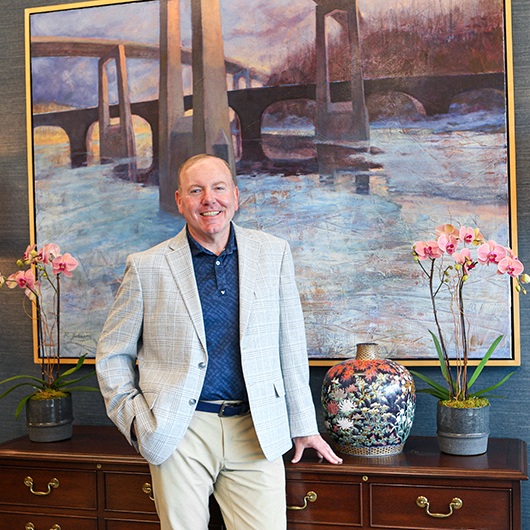
“We look at things from the team perspective,” says Bill Benecke, executive vice president and chief claims officer. “We’re a flat organization and we have a humble leadership team. When employees join this organization, they get a sense of connectivity to the leadership of the company.
“They come to know our values, appreciate our wanting to give back to the community, our sense of volunteerism, and have a sense of participation and ownership in the company’s success,” he adds.
(See sidebar for more information on the PHLY Foundation’s story.)
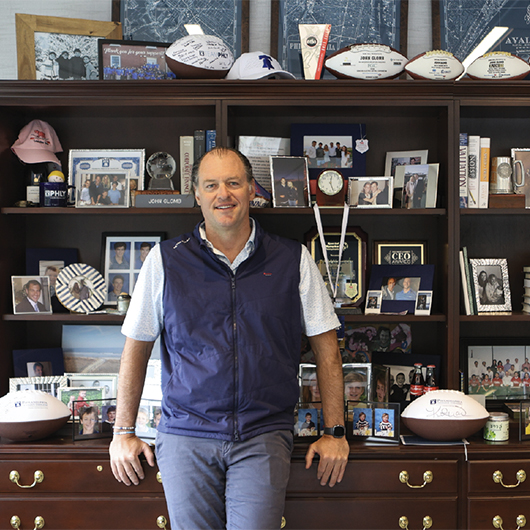
“All of us are very proud because we’ve all been architects of what PHLY is today. We really believe that we are unique—as a culture, as a company, in what we do for society, and in the way we partner.”
—John Glomb
President and CEO
Excellence in risk management and claims services
Benecke says PHLY’s risk and engineering professionals are dedicated to educating customers and providing tools like telematics to improve loss experience and lower long-term insurance costs.
“On the claims side, when customers are in an unfortunate circumstance and have a loss, we have a very significant, very experienced team of claim professionals who really care about what they do and the results they achieve for our customers,” Benecke adds.
When thinking back on covered catastrophes like wildfires, hurricanes, and tornadoes, Glomb says, “We’re proud of the way we’ve handled every one of them. That’s really where the rubber meets the road.”
To measure customer satisfaction for agents, brokers, and policyholders, PHLY’s Voice of the Customer (VOC) program gathers customer feedback, which lets them identify and support service improvements, both company wide and by department.
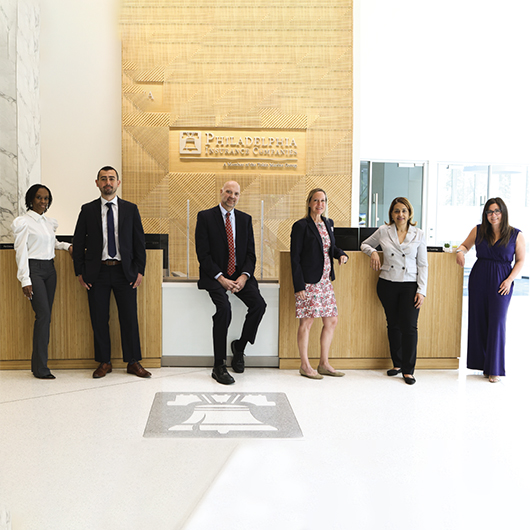
Left to right: Candace Holiday, Administrative Assistant; Richard Foronjy Talent Acquisition Operations Supervisor; Joe Piergrovanni, Senior Training and Development Manager; Laura Crossin, Senior Vice President Human Resources; Yesenia Lopez, Human Resources Business Partner; Jena Wisely, Assistant Vice President Human Resources
“Our risk management [Net Promoter Score] is in the 80s, which means we’re up in the Amazon/Ritz-Carlton territory. That says it all.”
—Brian O’Reilly
Executive Vice President and Chief Marketing Officer
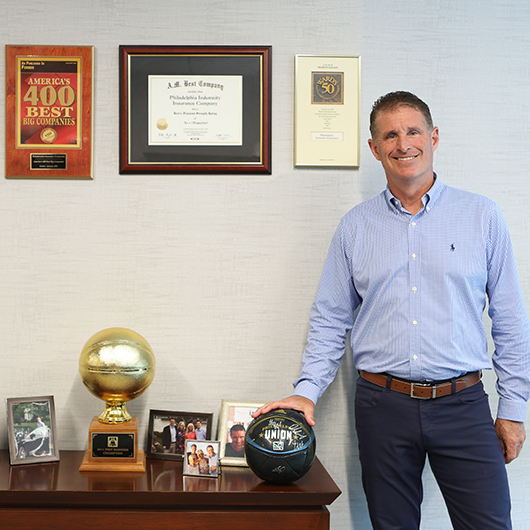
“Our risk management [Net Promoter Score] is in the 80s, which means we’re up in the Amazon/Ritz-Carlton territory,” O’Reilly says. “That says it all.”
Planning for the future
Starting each summer, the executive team starts planning strategic moves—which they call “the play”—for the coming year. In the following January and February, they share the messages in person with the firm’s 3,000 employees nationwide. Then, they communicate the same information to preferred agents.
“Our view is: The more complicated it is, the more likely [customers] are going to go to somebody else to find a solution. [So] that level of transparency with our trading partners is critical,” Glomb says, adding that the ongoing hard market makes transparency even more important.
When a mutual client needs to hear a difficult message about their policy, the PHLY team offers to get on the phone with the agent to deliver the difficult message. “In the end, the insured might not be happy, but we don’t want our agent partner to lose that account,” Glomb adds.
PHLY’s focus on developing and maintaining strong relationships with agencies, brokers, and customers through a hands-on approach is the insurer’s main strategy.
“We believe that the carriers that are the easiest to do business with over the next number of years are going to be the winners—game, set, match—in the market,” he says.
Niches that fit
As for coverages, if you have a customer that’s a nonprofit organization in the social services, museum, or cultural institution spaces, this continues to be PHLY’s expertise and largest segment.
Does a guided tour company need coverage? They’re on track for that. Accident and health programs for school or college students? They have the cure. What about amateur and professional sports? They’re on your team.
And the list goes on.
Sidebar:
PHLY Foundation gives back
While PHLY is the largest insurer of nonprofits nationwide, it also gives back through a substantial foundation, reflecting its commitment to the communities its employees live and work in.
“There’s a lot of good we can do in the world,” Glomb says.
Programs include a variety of initiatives. With Children’s Hospital of Philadelphia, the foundation has supported the fight against pediatric cancer and funded financial literacy support for lower-income families.
PHLY also funds scholarship programs, partners with organizations like Special Olympics PA, and donates to causes such as the national Shoes That Fit program, which provides new athletic shoes to children in need.
Employees who volunteer with a nonprofit can apply for significant stand-alone grants for the causes they care deeply about.
“If somebody gives to a cause, we will match that. But if somebody is on a board, volunteers their time, and gives their own time and treasure, we want to invest and put the money of our foundation behind them,” he says. “We want to show them that we care about them more deeply than just employees and teammates.”
The author
Maura C. Ciccarelli is a longtime freelance journalist originally from Philadelphia. She writes about business and more from an adobe home in southern New Mexico, after spending nine years living on the road fulltime with her husband in their Airstream trailer.

